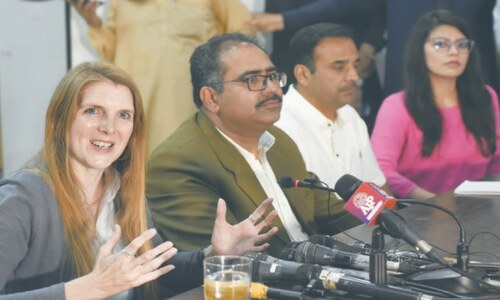RAWALPINDI: The chief of the Punjab police held a session with divisional police chiefs to decide the fate of police pickets after Prime Minister Imran Khan declared them to be an avenue of corruption and a public nuisance rather than a method of preventing and detecting crime.
Rawalpindi Regional Police Officer Ahsan Tufail and other senior police officials also attended the meeting.
The move came about after Mr Khan sent a special team to survey the operational status and functioning of police pickets which, if they needed to be retained, would be monitored to prevent corruption or manhandling.
Meeting of senior police officers decides snap checking could be substituted for police pickets
According to sources, it was decided to dissolve all checkpoints and to merge police personnel deployed at them into other police operations. But the meeting also expressed surprise that certain checkpoints - both permanent and temporary - were still functioning in various parts of the province including Rawalpindi.
Mr Tufail explained that police pickets were still functioning in the Rawalpindi division.
There are 18 permanent pickets that have been retained for sensitive installations as well as joint pickets with the Rangers, he told the meeting.
A senior police official toldDawnthat all the temporary pickets erected by police have been removed and 18 permanent ones, including five joint check posts, remain in the division.
He said all supervisory officers were directed to carry out surprise checks to see if police officials were setting up illegal pickets in the city in violation of standard operating procedure.
“Our top priority is to strengthen police stations, which are the basic component of policing and have been ignored in the past,” he said.
The divisional police chief of D.G. Khan justified the retention of police pickets as a response to imminent apprehension ofthe influx of tribal criminals and smuggling.In Sargodha, only inter-provincial pickets have been retained and the rest were abolished by the police in the wake of the prime minister’s directives.
Some police pickets have been retained in Multan but are being covered with CCTV cameras and are properly monitored.
It was recommended at the meeting that pickets could be replaced with snap checking if carried out intelligently and effectively.
Earlier this month, the Rawalpindi city police officer was directed to close all police pickets in the districts in light of complaints ofpolice taking bribes from trucks loaded with crushand from motorcyclists.
However, police pickets at the city’s points of exit were not closed.
Under the new strategy, station house officers (SHO) will conduct snap checking in their areas.
SHOs will have to devise a strategy against criminal activity that will not inconvenience the public or allow police officials to abuse their authority, a police official said.
He said that there are clear directions that police officials who trouble law-abiding citizens in the name of checking will face departmental accountability.
Published in Dawn, October 16th, 2019














































Dear visitor, the comments section is undergoing an overhaul and will return soon.